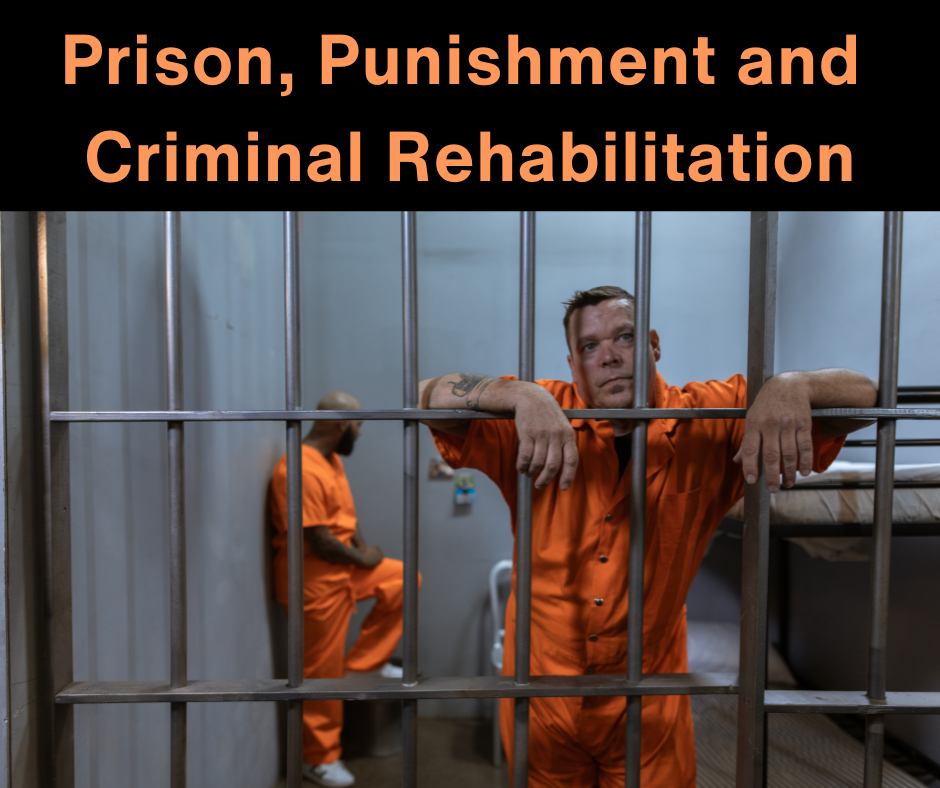
In today’s podcast, you’ll learn vocabulary connected to prisons and criminal rehabilitation. We also talk about the death penalty and ask the question; should criminals be helped or punished?
Voice message from Mamen
‘On the other hand’ (not XsideX)
Prison, Punishment and Criminal Rehabilitation
Crime Idioms: https://inglespodcast.com/412
Vocabulary
To go/be sent to prison/jail
To be/get locked up
The penal system
To do time / To be inside / to be behind bars
Conviction: A legal finding of guilt. (a convict, to convict)
Sentencing: When the judge decides the punishment for the guilty party
Inmate: A person incarcerated in a prison.
Parole: Conditional release of an inmate before completing the full sentence – to be (let) out on parole.
Parole board: A panel that decides parole eligibility.
On probation: Supervised release instead of imprisonment.
Rehabilitation: Efforts to restore offenders through education, therapy, or vocational training.
What is the difference between punishment and rehabilitation?

https://www.englishcraig.com/
Restorative justice: This involves bringing the perpetrator and victim together so that they can discuss the harm done a find a way forward to repair the damage as much as possible
Community service: When a convict undertakes unpaid work for the benefit of society, rather than doing prison time.
Forced labour: any work, especially in modern or early modern history, in which people are employed against their will.
Reintegration: Helping ex-convicts return to society successfully.
What challenges do ex-convicts face during reintegration into society?
Prison guard/Correctional officer: A staff member responsible for prison security.
The prison-industrial complex: The network of government and private agencies involved in the construction and operation of prison facilities, regarded as a powerful vested interest that profits from incarceration.
There are approximately 2.3 million people incarcerated in the United States (nearly 1 out of every 100 American adults). About 0.7% of the United States is currently in a federal or state prison or local jail with an additional 4.5 million people on probation or parole. Source: https://www.prisonpolicy.org/
The US has the world’s highest incarceration rate and, despite representing under 5% of the global population, the US holds almost 20% of the global prison population. (Source: Tufts University)
Some US prisons have factories that make a profit of almost half a billion dollars per year.
Prisoners receive a wage from 23 cents to $1 per hour for working in these factories. Source: https://morethanourcrimes.org/voices/private-or-public-prisons-profit/
Solitary confinement: Isolating an inmate from others as punishment.
Capital punishment: The death penalty for serious crimes.
As of 2024, a total of 52 countries have retained the death penalty. In order of number of executions carried out annually, the top 5 are: China, Iran, Saudi Arabia, Egypt and the USA. China is far and away the leader, though the government refuses to reveal exactly how many.
Forms of execution still in use today: beheading (decapitation), hanging, lethal injection, the electric chair (electrocution), shooting (by firing squad).
Is capital punishment an effective deterrent or a moral dilemma?
Corporal punishment: The use of physical harm as punishment
Judicial corporal punishment is still allowed in many countries, including, among others: Singapore, Malaysia, Iran, Saudi Arabia, Qatar, parts of Nigeria, parts of Indonesia, UAE, Pakistan, Somalia and Tanzania.
Forms of corporal punishment still in use today: caning, flogging/whipping (to be given X lashes), amputation. Caning or flogging is carried out on the bare back, bare buttocks or clothed buttocks, depending on the crime and country.
…and now it’s your turn to practise your English. Should convicts be punished or helped? Are there some crimes for which the death penalty should be given?
Send us a voice message. https://www.speakpipe.com/inglespodcast
Send us an email with a comment or question to [email protected] or [email protected]
If you’re a Spanish speaker and you want to study for free, visit the mansioningles website and for paid eBooks and audios for self-study check out the online store: https://store.mansioningles.net/
Thank you to our Patreon supporters. Join our Patreon program for as little as $1.50 per month and you get instant access to the transcriptions of this podcast. https://www.patreon.com/inglespodcast
Welcome to our new Patreon supporters who have joined us this month:
Samuel Perez
Juan Gatti
Elisa Amparo del Río Peris
Juan Carlos Alumbreros Fresneda
Garirazu
Pilar Hernandez Garcia
In next week’s episode: From ‘About’ to ‘Give or Take’: Different ways to say ‘approximately’
If you enjoyed this podcast, please tell your friends.
The music in this podcast is by Pitx. The track is called ‘See You Later’



